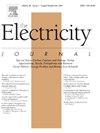Electric mobility investments: Insights from power-transport coupling from developing countries
IF 2.2
Q1 Social Sciences
引用次数: 0
Abstract
Electric mobility seems promising for the decarbonisation of the power and transport sectors. Nonetheless, making investment decisions on electric mobility in developing countries remains topical in policy and academic debate. This paper contributes to the transport and power sector coupling debate to understand investment decision-making on electric mobility. We propose a framework and identify developing countries that could be considered for private-sector investment in electric mobility. We validate our framework with case studies on investments in electric mobility in China, Brazil, India, Colombia, Türkiye and Chile. We argue that developing countries with wholesale power markets, and wholesale and retail power markets could attract investment in electric mobility, albeit with a proliferation of low total cost of ownership electric mobility investment options such as two and three-electric wheelers and investments such as electric buses perceived to have notable contributions to achieving environmental/climate objectives. Thus, we argue that our framework and analyses could be helpful for policymakers and stakeholders in the power and transport sectors to identify and select developing countries for private sector-led electric mobility investment.
电动交通投资:来自发展中国家电力运输耦合的见解
电动交通似乎有望实现电力和交通部门的脱碳。尽管如此,在发展中国家对电动交通进行投资决策仍然是政策和学术辩论的主题。本文有助于交通和电力部门的耦合辩论,以了解电动交通的投资决策。我们提出了一个框架,并确定了可以考虑私营部门投资电动交通的发展中国家。我们通过对中国、巴西、印度、哥伦比亚、智利和智利的电动交通投资案例研究来验证我们的框架。我们认为,拥有批发电力市场以及批发和零售电力市场的发展中国家可以吸引对电动交通的投资,尽管低总拥有成本的电动交通投资选择(如两轮和三轮电动汽车)和投资(如电动公交车)被认为对实现环境/气候目标有显著贡献。因此,我们认为,我们的框架和分析可以帮助电力和交通部门的政策制定者和利益相关者确定和选择发展中国家,以进行私营部门主导的电动交通投资。
本文章由计算机程序翻译,如有差异,请以英文原文为准。
求助全文
约1分钟内获得全文
求助全文
来源期刊

Electricity Journal
Business, Management and Accounting-Business and International Management
CiteScore
5.80
自引率
0.00%
发文量
95
审稿时长
31 days
期刊介绍:
The Electricity Journal is the leading journal in electric power policy. The journal deals primarily with fuel diversity and the energy mix needed for optimal energy market performance, and therefore covers the full spectrum of energy, from coal, nuclear, natural gas and oil, to renewable energy sources including hydro, solar, geothermal and wind power. Recently, the journal has been publishing in emerging areas including energy storage, microgrid strategies, dynamic pricing, cyber security, climate change, cap and trade, distributed generation, net metering, transmission and generation market dynamics. The Electricity Journal aims to bring together the most thoughtful and influential thinkers globally from across industry, practitioners, government, policymakers and academia. The Editorial Advisory Board is comprised of electric industry thought leaders who have served as regulators, consultants, litigators, and market advocates. Their collective experience helps ensure that the most relevant and thought-provoking issues are presented to our readers, and helps navigate the emerging shape and design of the electricity/energy industry.
 求助内容:
求助内容: 应助结果提醒方式:
应助结果提醒方式:


